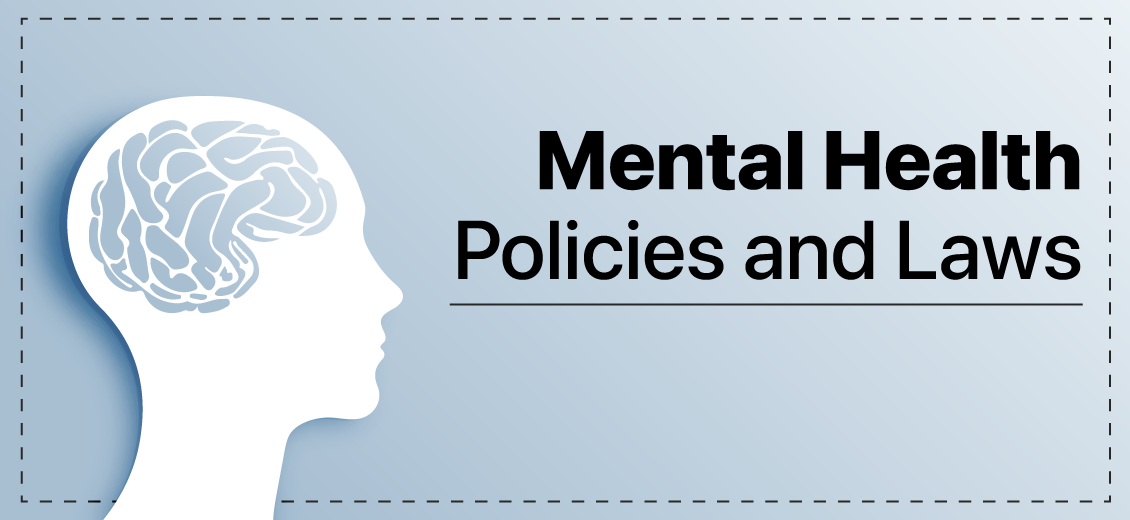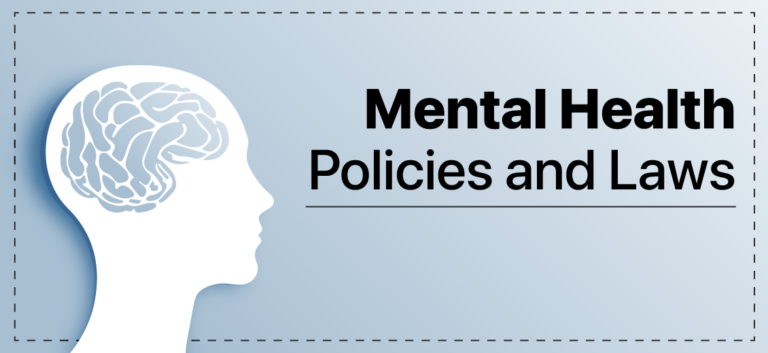Mental health policies and laws
Blog home

Every year on October 10, the World Mental Health Day Is observed. The World Federation for Mental Health (WFMH) has unveiled the WFMH Global Campaign 2023, which marks the 75th anniversary of WFMH. This year’s theme is “Mental health is a universal human right.” The purpose of this blog is to take stock of the current state of Mental Health around the world and understand the need for mental health policies. In this blog, I will discuss the current situation of mental health worldwide, mental health policies, the legal framework surrounding mental health, some key initiatives as well as the benefits and challenges of mental health laws.
Current state of mental health in the world
The prevalence of mental health problems is increasing globally, mainly attributed to demographic changes. Over the past decade, through 2017, mental health issues and substance use disorders increased by 13%. Depression is the leading cause of disability worldwide. Mental health problems, including alcoholism, rank high among the top ten causes of disability in both developed and developing countries. These issues affect all aspects of life, often accompanied by stigma, discrimination and abuse.
Surprisingly, less than 2% of the global median public health spending is spent on mental health. Effective treatments exist but remain inaccessible to many. Poverty, limited education, gender inequality, violence and illness often contribute to poor mental health, preventing individuals from reaching their full potential and contributing to their communities.
Addressing mental health requires increased investment in awareness, access to quality care and research into better treatments. The recognition of mental health as a vital barrier to development is gaining momentum, highlighting the importance of addressing these invisible but important challenges to achieve global development goals.
Importance of mental health policies and laws
The increase in mental health cases has become a new reality. In such a scenario, a regulatory framework is essential to protect the rights of people with mental health disorders and advance the provision of high-quality care. A legal framework would make it possible to integrate mental health into public health policy. When legislation is in place, it is easier to access care, which improves the chances of diagnosis of anything mental health problem while reducing the risks of poor mental health.
Additionally, by reducing excessive financial burdens of seeking mental health care, financial protection is provided by pre-existing policies. Mental health policies can also hold service providers accountable for outcomes and client experiences, ensuring that people receive high-quality care and their needs are met in a respectful and effective manner. Last but not least, mental health policies can encourage research and innovation in this area, expanding our knowledge of mental health illnesses and services, improving available treatments, and encouraging further study.
Legal framework surrounding mental health
- The Substance Abuse and Mental Health Services Administration (SAMHSA) is an agency of the U.S. Department of Health and Human Services responsible for administering laws and rules relating to substance abuse and mental health services. The goals of these laws and rules are to ensure that people with mental health disorders receive quality care and that health care professionals are held accountable for outcomes and patient experience.
- THE Mental Health Act 2017 (MHCA 2017) in India specifically addresses patients’ rights and establishes moral and legal standards for mental health care. This law places a strong emphasis on the value of confidentiality, informed consent, and the right to mental health treatment.
- People diagnosed with mental health disorders have the right to be free from all forms of abuse, including methods of coercion and isolation. They also have the right to decide how they want to live, including how they want to be treated, reside, and actively engage in the communities of their choice. People with mental health conditions are frequently targets of discrimination in areas such as housing, employment and education.
Some key mental health initiatives
- In 1991, the United Nations General Assembly (UNGA) adopted principles for the protection of people with mental illness and the improvement of mental health care. It mentions 25 principles including fundamental freedoms and fundamental rights, protection of minors, community living, determination of mental illness, medical examination, standards of care and treatment.
- World Health Organization (WHO) launched a special initiative for mental health (2019-2023): Universal health coverage for mental health. Through this program, 100 million people will have access to high-quality, economically feasible treatment for their mental health problems in 12 priority countries.
- Global Mental Health Advocacy Roadmap for 2022-23: This roadmap outlines several critical goals for accelerating progress on mental health, such as achieving global and national policy reform and increased funding, integration of mental health into universal health coverage, respect for everyone’s rights. to good physical and mental health, by improving monitoring and accountability, and creating and disseminating best practices.
Benefits of mental health policies
There are many reasons why effective mental health policies can be very beneficial. First, when clear policies and laws are in place around mental health, outcomes for both individuals and society as a whole will improve. The stigma surrounding mental health would diminish, if not disappear, when the government and international organizations recognize the need to provide mental health care and pass laws. This can positively lead to an increased level of awareness and sensitivity among the general public.
It can also lead to an increase in the level of productivity in the workplace through the promotion of mental well-being at work. Health costs related to mental health problems can be reduced through the support of effective mental health policy. Policies can help reduce the need for more costly procedures and hospitalizations by encouraging preventative and proactive intervention. Most importantly, mental health legislation can improve a person’s quality of life. It can help people lead happy, full lives by promoting mental well-being, ensuring access to high-quality mental health care, and addressing the social aspects of mental health.
Challenges in Implementing Mental Health Laws
- Mental health stigma: The stigma associated with mental illness can make it difficult to access mental health services and make it difficult to adopt and enforce mental health regulations. Mental health still doesn’t receive as much attention as physical well-being. Efforts to reduce stigma and raise awareness can help make mental health treatment more accessible.
- Lack of research capacity: Closing the gaps in mental health care is difficult due to the lack of research facilities for implementation and policy reform. To determine the most effective methods for implementing and enforcing mental health laws, additional research is needed.
- Lack of professionals and services: The lack of qualified mental health professionals could make it difficult to effectively execute and enforce mental health legislation. Access to essential mental health services could be delayed due to this shortage. Additionally, challenges in implementing and complying with mental health laws can be attributed to fragmented service delivery models. This problem can be addressed by integrating mental health treatment into primary care.
- Resource constraints: Implementing and complying with mental health regulations can be difficult in particularly sensitive areas, such as those experiencing armed conflict and obstacles to development, due to resource constraints such as poor infrastructure and security issues. Resources should be made available by governments and international organizations to help implement mental health laws in these situations.
- Lack of self-confidence : Implementation and enforcement of mental health laws can be hampered by barriers to accessing mental health care, such as lack of insurance. To strengthen access to care, it is crucial to ensure sufficient coverage of mental well-being.
Conclusion
Mental well-being is vital to the overall health of any individual. As a younger generation, I ask my readers to understand the importance of this and recognize that it is crucial for us to destigmatize mental health problems. Awareness, sensitivity and empathy can go a long way in making the world a better place. For legislation to be put in place, it is essential to ensure that mental health is recognised, promoted and protected, and that immediate action is taken to ensure that all individuals are able to exercise their fundamental rights and get necessary mental health care.
Sources:
Annie Pruthi

Annie Pruthi graduated with a Masters in Political Science from Jamia Millia Islamia. She is currently working as a research intern at PRIDE, Lok Sabha Secretariat. She is also co-author of the book “Will You Stay?” and recipient of the Coimbatore Literary Awards. (2020). His research interests include Indo-Pacific studies.
